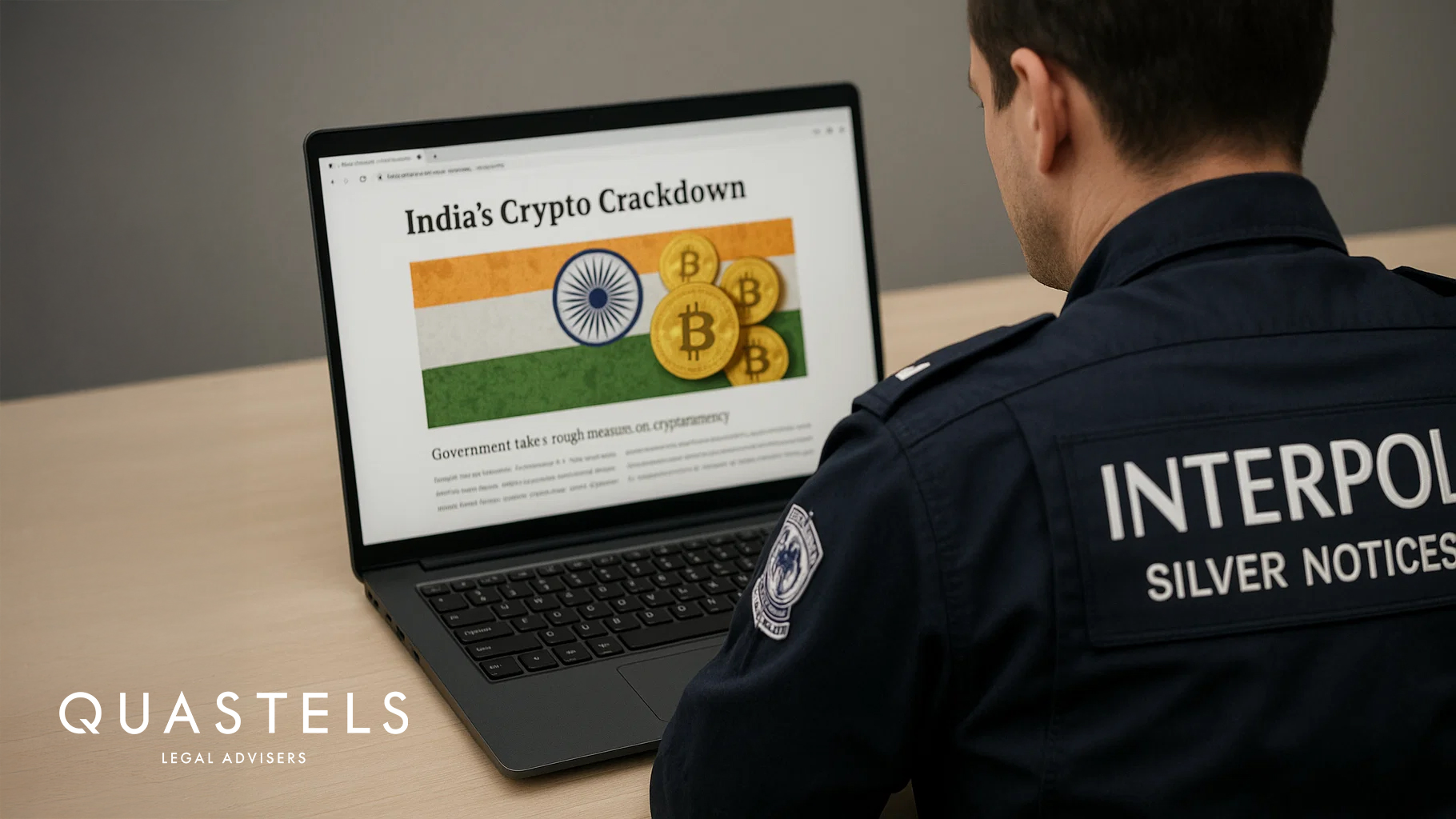In a development of growing significance to cross border legal practitioners and asset protection advisors, INTERPOL has introduced a new category of international alert: the Silver Notice. This tool, designed to trace and recover criminal assets globally, represents a material evolution in the architecture of international law enforcement. In May 2025, India issued its first ever Silver Notices, applying the mechanism in two high value crypto fraud cases. The move signals a more assertive posture by Indian authorities and underscores a broader trend of convergence between asset recovery, financial regulation, and cross border policing.
What Is An INTERPOL Silver Notice?
Launched in January 2025, the Silver Notice is INTERPOL‘s latest alert mechanism, joining its suite of colour coded notices such as the Red (wanted persons) and Blue (location of suspects). Uniquely, the Silver Notice is designed not to locate individuals, but to trace proceeds of crime, including real estate, corporate interests, financial accounts, and digital assets such as cryptocurrency wallets and NFTs.
The mechanism operates under INTERPOL Rules on the Processing of Data (RPD) and is primarily used to facilitate international cooperation in asset identification and restraint, often preceding mutual legal assistance requests or asset seizure applications in local courts.
India’s First Silver Notice: A Strategic Shift
As part of a pilot involving 51 participating countries, India has deployed its first ever Silver Notices in the following two matters:
Shubham Shokeen
A former visa officer at the French Embassy in Delhi, accused of issuing Schengen visas in exchange for bribes ranging from ₹15 lakh to ₹45 lakh per applicant. The proceeds were allegedly used to purchase luxury property in Dubai valued at 15.7 crore. India had earlier issued a Blue Notice to locate Mr Shokeen; the Silver Notice now aims to trace and recover his Dubai assets.
Amit Lakhanpal
The founder of a fraudulent cryptocurrency scheme, MTC, which raised ₹113 crore from investors without regulatory approval. Lakhanpal is accused of impersonating a senior government official and misappropriating funds internationally. A Red Notice was previously issued against him; the new Silver Notice targets the recovery of assets generated by the scam.
The significance of these notices cannot be overstated. This is not only India’s first deployment of this enforcement tool, it is also one of the first globally, placing India at the forefront of INTERPOL’s new asset recovery regime.
Legal Analysis: Implications for the UK and Cross Border Practice
For clients and advisers with international exposure, particularly those operating in digital finance or holding property abroad, Silver Notices introduce a new category of legal risk. From a UK legal standpoint, several key frameworks come into focus:
- Proceeds of Crime Act 2002 (POCA) and Civil Recovery. Under Part 5 of POCA, UK enforcement agencies such as NCA or HMRC can initiate civil recovery proceedings based on foreign intelligence, including INTERPOL notices. A Silver Notice involving assets in the UK could prompt an Account Freezing Order (AFO) or Property Freezing Order (PFO), even in the absence of domestic criminal proceedings.
- Economic Crime and Corporate Transparency Act. Recent amendments under this legislation have strengthened the ability of UK agencies to seize and convert crypto assets linked to criminal activity. These powers can be exercised on the basis of intelligence from foreign jurisdictions, including INTERPOL alerts, if properly supported by evidence.
- Mutual Legal Assistance and Bilateral Agreements. The UK India Mutual Legal Assistance Treaty (MLAT) and provisions under the Crime (International Co operation) Act 2003 permit cooperation in tracing and seizing assets, even where those assets are held by nominee structures, SPVs, or in anonymised digital wallets. A Silver Notice can serve as a basis for initiating such cooperation.
- Due Process and Abuse Safeguards. Silver Notices do not currently undergo the same scrutiny as Red Notices, but clients subject to one may experience reputational harm, banking restrictions, or immigration complications. There remains the possibility of challenging such notices before INTERPOL’s Commission for the Control of Files (CCF) on grounds such as procedural fairness, abuse of process, or violation of due process norms.
Strategic Guidance for Clients and Institutions
The emergence of Silver Notices has direct implications for:
- Private clients with cross border wealth structures
- Crypto asset holders, including early investors and exchangers
- Family offices managing international portfolios
- Banks and fiduciaries with KYC and PEP screening obligations
At Quastels, we advise clients facing complex international scrutiny and enforcement risks, including INTERPOL alerts, crypto seizures, and asset protection matters. Our multi-disciplinary approach spans immigration, international protection, and cross border support.
Conclusion
The deployment of Silver Notices marks a pivotal shift in the global enforcement landscape, signalling that suspected financial crime, particularly involving digital assets, will increasingly be met with proactive, internationally coordinated responses. For individuals and institutions with cross border exposure, the focus is no longer solely on personal liability but on the traceability and recovery of assets, wherever they are held.
At Quastels, we are uniquely positioned to guide clients through this complex terrain, combining technical expertise in international protection, and immigration with a strategic understanding of international enforcement trends.









